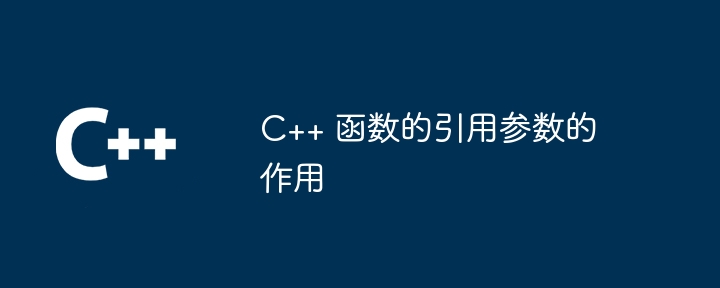
C Reference parameters allow a function to directly modify the variable at the calling function without creating a copy. Functions include: modifying actual parameters and providing direct access to original variables. Improve efficiency, avoid creating copies, and reduce memory overhead and time complexity. Avoid accidental modifications. Using reference parameters for input parameters prevents functions from accidentally modifying variables at the calling function.

The role of reference parameters of C function
Introduction
The reference parameters are A powerful tool in C that allows a function to directly modify the variable at the calling function instead of creating a local copy. This is especially useful in situations where large data structures need to be passed efficiently or where actual parameters need to be modified.
Syntax
Reference parameters are represented in function definitions using the & notation.
void myFunction(int &x);
Variables passed to reference parameters must be called using the & notation.
int main() {
int y = 5;
myFunction(y);
// y 现在为 10
return 0;
}Function
Practical case
Consider a function that exchanges two integers:
void swap(int &a, int &b) {
int temp = a;
a = b;
b = temp;
}Call this function:
int x = 5, y = 10; swap(x, y); // x 现在为 10,y 为 5
Conclusion
Reference parameters are a powerful tool in C that can be used to improve function efficiency, directly modify actual parameters, and prevent accidental modifications.
The above is the detailed content of The role of reference parameters in C++ functions. For more information, please follow other related articles on the PHP Chinese website!
 What are the differences between c++ and c language
What are the differences between c++ and c language
 Recommended learning order for c++ and python
Recommended learning order for c++ and python
 Cost-effectiveness analysis of learning python and c++
Cost-effectiveness analysis of learning python and c++
 Is c language the same as c++?
Is c language the same as c++?
 Which is better to learn first, c language or c++?
Which is better to learn first, c language or c++?
 The difference and connection between c language and c++
The difference and connection between c language and c++
 C++ software Chinese change tutorial
C++ software Chinese change tutorial
 Cost-effectiveness analysis of learning python, java and c++
Cost-effectiveness analysis of learning python, java and c++




